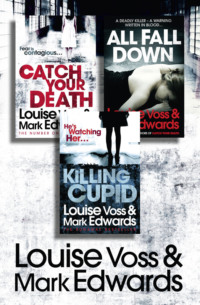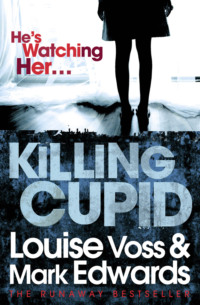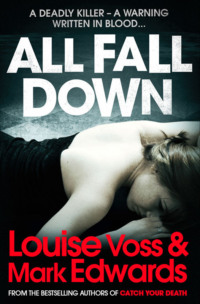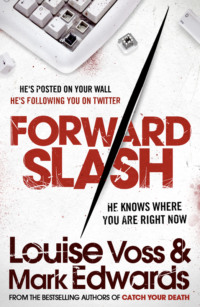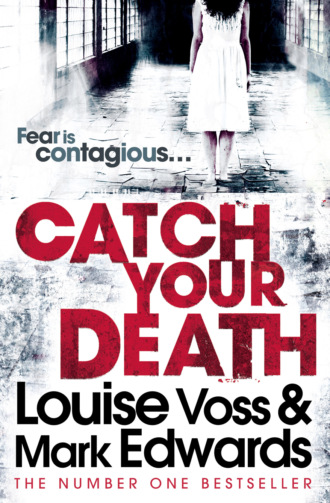
Полная версия
Catch Your Death
As they reached the kerb, she stuck her arm in the air as she spotted a taxi with its orange light on, but another man, a businessman with a phone stapled to his ear grabbed it first. The cab crawled away – traffic didn’t speed in this part of London, where gridlock had become something else for tourists to write home about – and she cursed under her breath. She looked around for another cab.
And saw a ghost.
Chapter 3
‘Stephen!’
Life is full of moments like this – snap decisions, taken unconsciously, and when people ask, later, ‘Why did you do that?’ the only honest reply is, ‘I don’t know.’ The sole explanation she could think of was that, in that moment, she was flung back in time to a night when she thought she’d died and gone to Hell. When she’d walked in despair through the grounds of the Cold Research Unit and searched for her lover.
And if she’d seen him then, she would have called out his name, like she did now.
But he didn’t react.
The man on the other side of the road didn’t flinch or alter his expression. He just stood there, drinking from a Starbucks cup, staring into the middle-distance and frowning. He wore a grey pinstriped jacket and faded blue jeans. His hair needed a cut and flopped over the rim of his glasses. Staring at him, she recognised the same traces of age she’d noticed in the mirror: the crow’s feet, the lines at the side of the mouth that held a history of smiles, the lines on the forehead that mapped a legacy of sadness. When the wind ruffled his hair she noticed that it was receding, just a little. But it was definitely him. Even though it couldn’t have been.
Kate felt as if she’d just been punched in the solar plexus; as breathless as the night the Centre caught fire. The people and the traffic around her blurred. Only Stephen stayed in focus. He began to walk away, dropping his coffee cup into a rubbish bin, and moving off quickly.
‘Mum, are we looking for a taxi?’
‘Yes. I . . . come on.’
‘Where are we going?’
She didn’t answer. She escorted Jack across the road and followed the man who looked so like Stephen, but who couldn’t be Stephen, because he had been killed in the fire that night. He made his way up a quieter street towards Shaftesbury Avenue.
‘Mum, why are you walking so quickly?’
‘I’m in a hurry.’
Jack whined. ‘But I’m tired. My legs hurt.’
She should have stopped then, stuck to her original plan – a taxi back to the hotel, a hot bath, let Jack watch the kids’ channel on the hotel TV. This was insane. Stephen was dead. He’d been dead for sixteen years. This was just a guy who looked like him, a doppelgänger. Isn’t everyone supposed to have a double somewhere? Or maybe she was just imagining the likeness, fulfilling a fantasy that Stephen was still alive. She hadn’t seen him for sixteen years, so how could she say this man looked just like him?
But he did. She had carried Stephen’s face locked in her memory for a decade and a half. Whatever else she’d forgotten, she had never forgotten him. This guy did look exactly like him, and that was weird and worth investigating.
She felt compelled to follow him, despite her son’s complaints.
He turned the corner onto Shaftesbury Avenue. The faces of famous Hollywood actors gazed down at her from theatre billboards; Jack made some comment about ‘Chitty Chitty Bang Bang’. The ghost, or lookalike, or whatever he was, turned right. Luckily, the crowds slowed him down so he didn’t get too far ahead even though she was having to drag along her son, plus his robot. He turned another corner, then another, and they found themselves on a quieter street lined with Chinese restaurants and shops flogging cheap bags and faux-silk.
‘Mum, Billy’s tired too,’ Jack said, waving his robot in the air, and just as she was about to respond, the man stopped and turned around.
He looked straight at her. ‘Why are you following me?’ he asked.
Kate felt like an idiot. This was an act of madness, the kind of thing Vernon accused her of. You need help. Some pills. You should see someone. Let me call Doctor Mackenzie. And she’d cry, get angry, protest – I’m sane. There’s nothing wrong with me. I don’t want any drugs. I don’t need them. It was the way he looked at her. It made her believe she was losing her mind.
God only knew what Vernon would have said about this.
The ghost/lookalike took a few wary steps towards her. He gazed curiously at her, then down at Jack and back at her.
‘Stephen?’ she said, holding her breath.
He shook his head. ‘You’ve made a mistake.’
He didn’t seem angry. At least that was something. He wasn’t going to shout at her. But even though he said she’d made a mistake and, of course, she knew he couldn’t really be Stephen, he didn’t only look like her long lost boyfriend – he sounded the same too. His voice was identical: well-spoken English, a soft voice, intelligent. Sexy.
She realised that Jack was looking up at her with wide eyes, scared of the strange man. She put her hand on Jack’s head and smiled. The man must have seen the boy’s fear too. He winked at him.
‘I’m really sorry,’ Kate said, in a rush. ‘I’ve made a stupid mistake. You look exactly like someone I used to know, this guy I used to be close to, and I had to try and find out if you . . . it’s stupid because . . .’
‘He’s dead.’
She stopped her babble and stared at him.
‘I assume you’re talking about Stephen Wilson?’
She nodded dumbly.
The man smiled with one corner of his mouth. ‘He was my brother.’
Chapter 4
Ania, the hotel babysitter, was well-used to neurotic parents who felt pinned between anxiety and eagerness – the eagerness to get out and see the city, not spend their vacation tied down by the kids. But this woman, with her little boy, seemed more worried than average. Her voice trembled as she spoke and she dropped her handbag on her way to the door. Her purse, her keycard and tissues all tumbled onto the carpet and she bent quickly to scoop them up. Highly-strung. Or up to something. She had that air about her. She was doing something that made her ill at ease; something secret.
If she had to bet on it, Ania would wager that it involved a man.
The boy, on the other hand, was relaxed, leaning back in his chair clutching a toy robot to his chest, his free hand expertly handling the remote control, flicking from cartoon to pop video to wildlife programme. He giggled at the sight of meerkats playing on screen. Perhaps he didn’t realise that his mother was about to go out. Or perhaps he was secure enough in her love to know that she’d be coming back – it was the ones who were insecure who usually freaked out the most.
Ania finally managed to get the nervous woman out into the corridor. The boy had an American accent but the mother was English. It was intriguing. Where was the father? Not that Ania was really all that interested. As long as she got paid, who cared? She liked the boy, though. He seemed like a nice kid.
The woman said, ‘Here’s my mobile number, and the name and number of the restaurant, just in case. I’m Kate, by the way. And you’ve already met Jack.’
‘Okay.’
‘Bye Jack, sweetie,’ she called. ‘See you later.’
‘Bye.’ He didn’t look up. The meerkats were more interesting. Ania was relieved – no tantrums to deal with. Good. She felt a sudden tickle in her nose, and sneezed.
Kate turned back. ‘Have you got a cold?’
She shook her head. ‘Maybe I am getting one.’
‘Hmm. Well, it depends if your body has encountered this virus before. If so, your antibodies will fight off the cold and it’ll go away.’
Ania nodded, not knowing what to say. She was pleased when the anxious mother finally left.
Kate emerged from the tube station and checked her watch. As so often happened, she had rushed out in a hurry and arrived early. Vernon was always going on about her obsessive need to be punctual and reliable. In the early days, he found it endearing; a positive character trait. Later, it became another sign of her uptightness.
She walked up Charing Cross Road and stopped outside a bookshop full of medical and scientific books. She recognised some of them. There was a famous book called The Plague on the Horizon, which contained several quotes from Kate. She had a signed copy back in Boston. The author had interviewed Kate because of her involvement in the investigation of the West Nile Virus, a potentially lethal illness that had first been seen in the US, in New York, in 1999. WNV, as virologists called it, caused muscle weakness and confusion in some people, and could lead to meningitis, paralysis and death in others. It was a particularly interesting virus (and when Kate said this to non-scientists they would raise their eyebrows, wondering how anyone could find such a horrible thing so interesting) because of the way it was transmitted. Mosquitoes became infected after feeding on virus-carrying birds, such as crows. One of those mosquitoes could then infect a human. Kate’s team were trying to develop a vaccine for WNV. So far, they had not been successful.
Kate caught sight of her reflection in the dark glass. Her face was pale, her eyes wide. She hadn’t been able to decide whether or not to wear make-up. This certainly wasn’t a date, but sometimes make-up made her feel more confident, less exposed to the world, so she’d put on a slick of lip-gloss, a touch of mascara. Still, she wasn’t looking her best. A large part of her wanted to be locked up safely behind the door of her hotel room with the TV on and Jack beside her. She hoped he’d be okay. That babysitter had seemed capable enough, but – she let her imagination reach out – what if she was a child-killer, a front for an international child-slave racket, or just plain irresponsible?
She castigated herself. Don’t be ridiculous, Kate. Relax. It’s a reputable chain hotel, the woman had references.
She pushed her hair behind her ears and stood up straight. All you’re doing, she reminded herself, is meeting the brother of an old boyfriend.
His name was Paul.
‘We were twins,’ he had said, a second after they’d met in the street and he had told her he was Stephen’s brother. Stephen had never mentioned he had a twin, which seemed very odd in retrospect. Maybe he did tell her, but she’d forgotten. So much of that summer was obscured behind thick fog. When she tried to remember those days, it was like trying to read a road sign without her contact lenses in. No matter how hard she strained, she couldn’t make out the details through the haze and, in the end, the effort became painful and she gave up.
When she played back that meeting with Paul in her mind, it made her cringe. She had felt so awkward, standing there with Jack, having to talk loudly over the roar of the London traffic. Paul seemed uneasy too. She couldn’t blame him – being confronted by a woman who is staring at you like you’re a phantom would do that to anyone.
‘How did you know Stephen?’ he had asked.
Kate had been aware of Jack looking up at her. Part of her wanted to turn and run. But she was hypnotised by the face of this stranger who looked so much like the man she’d loved long ago. Alongside unease, his face showed kindness, just as Stephen’s had. She had the sudden urge to launch herself at him, wrap her arms around him and kiss him. For years she had dreamt of a moment like this – of bumping into Stephen and him telling her, ‘It was all a mistake. Reports of my demise were exaggerated.’ And they’d embrace, and the years would disappear.
Except this wasn’t Stephen.
‘We were friends,’ she said.
‘At university?’
She almost told a second lie, but said, ‘No. I met him at the Cold Research Unit in Salisbury.’
‘Oh.’
She said, ‘I was there.’
He spoke softly. ‘There . . . when he . . .?’
‘Yes.’
Jack had spoken up then. ‘Mummy, what are you talking about? Billy’s bored. And he needs to pee.’
Jack’s words broke the tension and the adults laughed.
Kate said, ‘Look, I’m really sorry. I don’t normally follow strangers through the streets.’
Paul smiled. ‘It’s okay. It’s understandable.’
‘Maybe. But I’d better go and get Billy and his master back to the hotel.’
‘Hotel? You don’t live in London?’
‘We live in Boston,’ said Jack.
‘Really?’
Kate went to turn away, but hesitated. She didn’t want to say goodbye, but lingering there was pointless.
Paul said, ‘Wait,’ even though she hadn’t yet moved. ‘Would you like to meet for dinner?’
‘I . . .’
‘It would be nice to talk to someone who knew my brother. Our parents won’t talk about him because it’s too upsetting. I never see any of our old friends these days. Sometimes it feels like he never existed.’ He smiled wryly. ‘Except I see him every time I look in the mirror.’
Kate didn’t know what to say.
‘So, dinner? You can bring Jack and – Billy, is it? – if you like.’
Before she could change her mind, she blurted, ‘Where? What time?’
He pointed up the street at a restaurant. ‘Do you like Chinese? We could meet there at seven.’
‘Alright.’ She turned away, then realised she hadn’t told him her own name.
‘I’m Kate,’ she said.
Something happened when she said that; it was as if the name meant something to him but he wasn’t sure what. The moment passed and he smiled. ‘Okay, I’ll see you later.’
She killed twenty minutes walking slowly through Soho towards the Chinese restaurant. It was a warm, overcast evening, and the streets were rammed with people in T-shirts standing outside pubs. She hadn’t smoked for years, but she had a craving for cigarettes. And cider. She thought she knew why, too: she was going to meet a man she didn’t know for dinner, something she hadn’t done for a long, long time. It threw her back in time, made her feel like a teenager. She wouldn’t smoke or drink cider, or go to bed with this man, but she wouldn’t be enormously surprised with herself if she did. She’d done enough out-of-character things recently.
She paused outside the restaurant, inhaled the smell of cooking rice and sweet and sour sauce and MSG. She watched a trio of chickens rotating on a spit in a window opposite and had to look away. She hadn’t eaten meat, either, for years. Another thing that irritated Vernon – living with a goddamn vegetarian.
‘You enjoyed the taste of meat when we met,’ he said, the underlying innuendo making her shudder. She had to stop thinking about him. But how could she? When he found out what she’d done, as he would very soon . . . She didn’t want to think about it.
She didn’t have to. Paul arrived at that moment, appearing out of nowhere and grinning nervously at her.
‘I left Jack with a babysitter at the hotel,’ she said. ‘I hope he’s OK. I just thought it would be easier to talk without interruption.’
‘Sure,’ he said, easily.
She’d been worried that he might think she was planning to come on to him, farming her son out to a stranger, being a bad mother – but he didn’t seem at all fazed. ‘I’m starving,’ he added.
‘Me too,’ she said, although she wasn’t.
He led the way into the hot, noisy restaurant, waves of chatter rising and falling against a backdrop of the clatter of plates at a service hatch. A waiter showed them to a table, chucked a pair of menus down on the table and zoomed away again.
Seeing how taken aback Kate was, Paul said, ‘They’re famously rude in here. It’s part of the appeal.’
They exchanged pleasantries about the warm weather and Chinese food for a few minutes, ordered drinks and studied their menus.
The waiter reappeared. ‘Yes?’ he demanded, looking as though he wished he was anywhere else but here.
Paul gave the waiter a few numbers from the menu, and Kate did the same.
‘You’re vegetarian?’ he asked. When she nodded, he asked, ‘Do you eat fish?’
‘No, I’m vegetarian.’ She immediately regretted her snappiness. ‘Sorry, it’s just that everyone always says that – it’s like an automatic response. Proper veggies don’t eat fish.’
‘I’ll remember that.’ He pretended to make a note on an invisible notepad. ‘Fish have feelings too.’
He was charming. Just like Stephen – or rather, how Stephen would be if he’d had sixteen more years to practice. She had to keep reminding herself, though, that this wasn’t Stephen. She had to remember that she had only met this man this afternoon. Her fantasies were not coming true. On the way over, she kept asking herself why she was doing this, what her motives were. There were, in the end, two things.
One, she had never been able to talk to anyone else about Stephen. Now, like his brother, she relished the chance to talk to somebody about him, somebody who knew him intimately. Perhaps that way, after all these years, she could achieve some kind of – and she hated the word but couldn’t think of a better one – closure.
Two, she was glad of the distraction. She had only been able to think about one thing since arriving in London, and her brain needed a break from the worry. What better way to stop fretting about the future than to concentrate on the past?
‘So,’ Paul asked. ‘What brings you to London? Visiting relatives?’
It was far too complicated to explain, even if she’d wanted to. ‘No. Well, not really. Jack and I are just about to move over here.’ She played with her chopsticks, unsure of how much to tell him. ‘I’m looking for a place at the moment. Actually, I’m kind of shocked by the price of property in London.’
‘Where do you live at the moment? Oh yes, Boston, wasn’t it?’
‘Yes.’
‘Nice.’ He waited for her to give more details but she wasn’t forthcoming. ‘And what do you do in Boston?’
‘I work at Harvard.’
‘Doing . . .?’
Kate laid her chopsticks on the table. ‘I’m a professor in the department of immunology and infectious diseases. I specialise in the study and treatment of viruses.’
She watched Paul closely to see his reaction. Telling people what she did usually had two effects. Weak men, the kind who were intimidated by clever women, would try to outsmart or belittle her. Other people would inch away, like people she talked to on the extremely rare occasions she went to parties, as if they might catch something from her.
Paul didn’t appear to be at all intimidated or frightened. ‘Cool. So is that how you knew Stephen? You worked with him at the Cold Research Unit?’
‘No, I was a volunteer there. I’d only just graduated. And after that, I went to Harvard and, apart from the odd visit, never came back.’
‘Until now?’
‘Until now,’ she echoed, thinking how strange it was that you could summarise a life so quickly and painlessly, missing out all the important facts. Of how she went to Harvard, still in a state of shock, only weeks after Stephen’s death. The years she spent in the graduate research programme. Meeting and marrying Vernon Maddox – a man who could not have been more different to Stephen – and having Jack. The glorious day she became Professor Kate Maddox. Work, and Jack, had both continued to be fulfilling and enjoyable, but the rot had well and truly started to set in with Vernon by then. His fuse had grown shorter and shorter over the years, seemingly in inverse proportions to his nasal hair. What Kate had initially thought was passionate and forthright about him soon became perceived as merely hectoring and unpleasant.
She didn’t tell Paul all this, though.
‘And what do you do?’ she asked.
‘You might not believe this, but I chase viruses too.’
‘Really?’
‘Yes – but a different kind to you. Computer viruses. Or I should say, the scum who create them and send them out across the internet.’
‘You’re a cop?’
‘No. Not really. I work for an internet security firm. It’s a very exciting business.’
She smiled. ‘Sounds a bit geeky to me.’
‘Er, says the professor of – what was it? – immunology and infectious diseases?’
‘Touché.’
Paul laughed. ‘Actually, a lot of people think it’s a geeky job, and I do spend a lot of time staring at computer screens. But so must you.’
‘You’re right. Too much time.’
‘Except now you’re moving to London. Are you moving to a university over here? Kissing the Ivy League goodbye?’
He asked a lot of questions. Stephen had been curious like that too, interested in others.
Their food arrived, the waiter plonking it down on the table, shoving their glasses out of the way then stomping off. Kate was too busy trying to decide how honest to be to feel aggrieved by the waiter’s rudeness. Should she tell Paul that she had no idea about what she was going to do professionally; furthermore, that she didn’t care right now?
She said, ‘I’m considering my options at the moment.’
‘I see.’
They emptied their beer bottles and Paul put his hand up to order more. Kate licked her lips. She hardly drank at all these days and the beer tasted good: sweet and mood-changing. Tongue-loosening.
‘Tell me about Stephen,’ she said. ‘What was he like as a kid?’
Paul dipped a spring roll in sweet chilli sauce, and took a bite. ‘He was the leader, at first. He was born second – five minutes after me – and after that he spent his, I mean our, childhoods making up for it. He was the first to say “Daddy”, the first to walk across the living room instead of bum-shuffling, the first to climb the tree at the end of our garden. He was the first to get a girlfriend. Melissa, that was her name. She lived just down the road. A ponytail and freckles. We had a camp, which was really just a space between some bushes, and he took her in there and snogged her. I was so jealous.’
He laughed, rather awkwardly. ‘I suppose I was jealous of him in a lot of ways. We were competitive, always wanting to get the best marks at school or win at football. For once, I was better at that than him – he was hopeless – but he was better academically. Being good at football won me more points at school, but getting good grades went down better with my parents.’
‘Go on,’ Kate said softly. She felt as though she could listen to him talking about Stephen all night.
‘I don’t know what to tell you next. There’s so much.’ He was thoughtful for a moment. ‘There was a period when we were in our early teens when we didn’t want to be twins any more. We wanted to be individuals. I took the lead in this – Stephen really was an academic, always buried in a book, or carrying out experiments with this chemistry kit he had, which he upgraded every year. By the time he was a teenager it seemed to take over his whole bedroom. We called it his Gaseous Empire.’
He smiled at the memory, then continued. ‘Stephen lived in a dream world – a world of the mind – so he barely noticed when I went out of my way to look as different from him as I could. I cut my hair really short, got into hip-hop.’ He grinned again. ‘Break-dancing was big around that time.’
‘I remember it well.’
‘Stephen wouldn’t, if he was here. He didn’t know anything about what was going on in the street. I used to take the piss out of him for it. So did my friends. They all thought he was the world’s biggest nerd, and couldn’t believe he was my brother. I used to bring my mates round when my parents were out and we, my little gang, would rip the piss out of Stephen, call him the Prof, all this stupid stuff. We were gits.’
Kate didn’t say anything. My poor baby, she thought, and for a second she felt angry with Paul. Neither of them had eaten anything for several minutes. Paul was staring into the middle distance; into the past.
‘There was this kid that I used to hang around with called Terry. I didn’t really like him but he decided he wanted to join our group because he liked the same kind of music as we did. And everyone else was terrified of him. He was a little psycho, the kind of boy who tortured frogs for a laugh and terrorised the younger kids with demands for money. The kind of person I’d do anything to avoid these days.


